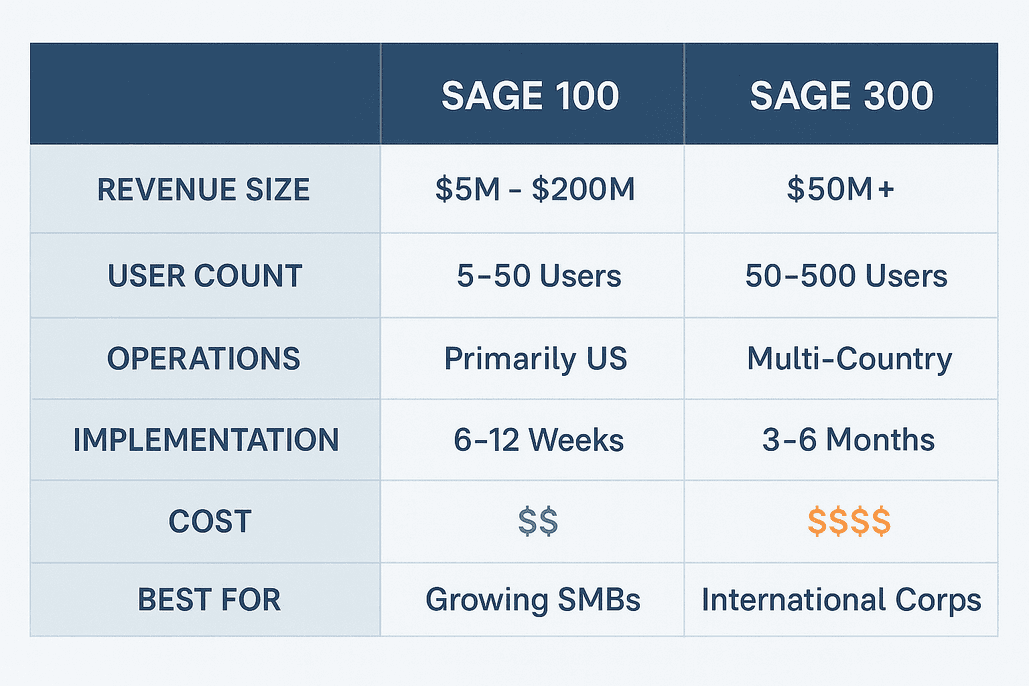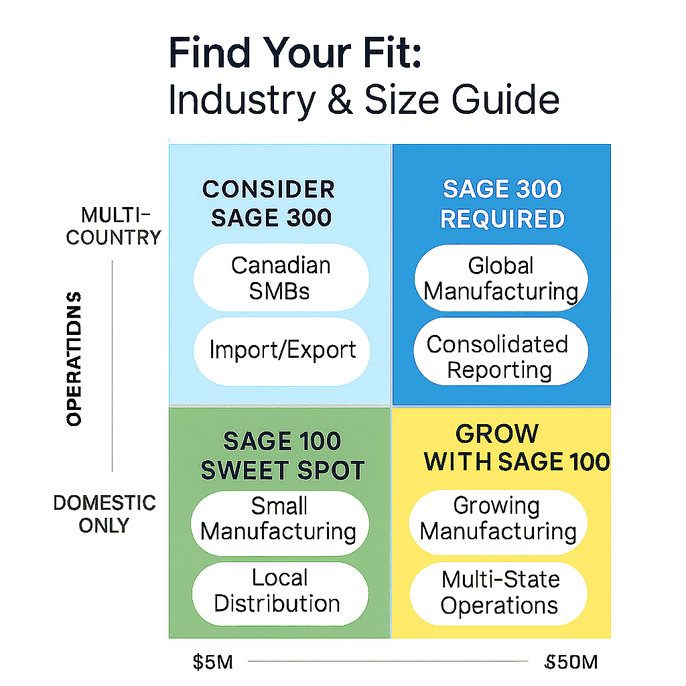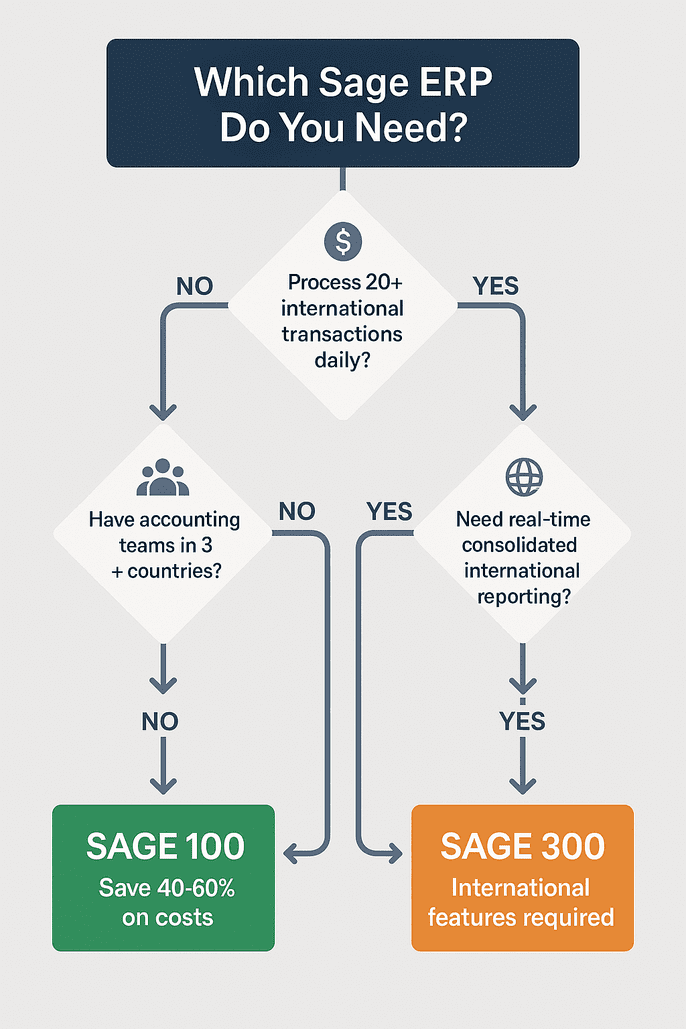Sage 100 is Designed for SMBs and Growing Businesses
Think of Sage 100 (once known as MAS 90/200) as the powerful, flexible engine for small to mid-sized companies whose operations are primarily within one country. The majority of our Sage 100 clients are headquartered in the United States. In our experience, businesses choose Sage 100 when they've outgrown QuickBooks and need a serious system for managing inventory, manufacturing, and accounting without the complexity of an expansive platform.

What This Really Means for Your Business:
- It Just Works: It provides a rock-solid foundation for your core financials (GL, AP, AR) so you can trust your numbers.
- Tames Inventory Chaos: It excels at managing the complexities of distribution and manufacturing, from order processing to the warehouse floor.
- Grows With You: Sage 100 is highly customizable. We’ve helped clients add modules for everything from barcode scanning to advanced manufacturing, tailoring the system to their exact needs. It scales surprisingly well as you grow.
- Plays Well with Others: It’s built to connect. We frequently integrate Sage 100 with e-commerce platforms (like Shopify and BigCommerce), CRMs, and other essential business tools.
Main Features of Sage 100:
- Comprehensive accounting (general ledger, accounts payable, accounts receivable, and bank reconciliation)
- Business process management
- Inventory management and order processing
- Multi-company management
- Integrated project management and job costing
- Reporting and business analytics capabilities
- Optional add-on modules and customizability for specialized industries
- Ability to integrate with multiple solutions like CRM, E-commerce Platforms, CAD software, etc.
Do you want to learn more about adding functionalities to Sage 100? Explore all Sage 100 Add-ons, integrations, and enhancements.
The most popular Sage 100 integrations we implement are:
- Sage 100 eCommerce integration – keeps online sales, orders, and inventory in sync so you save time and eliminate manual entry.
- Sage 100 EDI integration – automates vendor transactions, reduces costly errors, and delivers strong ROI by saving money on every order processed.
Ideal Use Cases for Sage 100
- Small and medium-sized businesses that want to establish basic accounting and business operations consistency
- Growing companies that require scalability and flexibility in their ERP system
- Manufacturers and distributors looking to automate processes and optimize inventory
- $3M–$200M in revenue – Below this, QuickBooks usually does the job. Above this, Sage 300 may be a better fit.
- Most successful Sage 100 implementations involve 5–50 users. Beyond that, enterprise systems often make more sense.
What industries is Sage 100 suitable for?
As a versatile ERP solution that can be on-premise, cloud-based, or hybrid, Sage 100 is ideal for various industries:
Manufacturing and wholesale organizations can leverage advanced production management, material requirements planning (MRP), and quality control modules to optimize operations and enhance efficiency.
For distribution companies, Sage 100 offers advanced warehouse management, purchasing, and order processing capabilities, optimizing supply chain management.
E-commerce merchants can seamlessly integrate their online sales platforms with Sage 100 enabling effective order, inventory, and customer data management. Want to learn more about specific Sage 100 e-commerce integrations? Contact us now for a quick conversation about e-commerce ERP Integration. We integrate popular e-commerce platforms like Shopify, Woocommerce, and Bigcommerce with Sage 100.
Retailers and professional service providers will appreciate the comprehensive financial management and integrated customer relationship management tools that enhance day-to-day business processes.
⚠️ A wrong-fit ERP can cost 10x more in the long run. Let’s spend 15 minutes to figure out if what is the best fit for your operations.
Sage 300: Catering to Multinational companies
Sage 300 (previously known as Sage Accpac) is an on-premise advanced ERP solution initially developed in Canada for medium-sized to large companies with operations in multiple countries. It offers customers a similarly-comprehensive set of features and functionalities as Sage 100, and includes robust features to simplify international business transactions, including multi-currency and multi-language support, inter-company transactions, and consolidated data and reporting.

Main Features of Sage 300:
- Advanced financial management and reporting capabilities
- Inter-company transactions and consolidated reporting for managing multiple entities
- Multi-currency functionality and multi-language support
- Enterprise resource planning, including project and service management
- Inventory management and order processing
Ideal Use Cases for Sage 300:
- Canadian companies sourcing and/or selling products in the United States or and countries
- Mid-market corporations with international business complexity
- Organizations that require advanced reporting and financial visibility
What industries is Sage 300 suitable for?
Sage 300 is an ERP solution that caters to users in a wide range of industries like Sage 100, providing customers with advanced features and functionalities tailored to their specific needs. Industries that can benefit from Sage 300 include:
- International Manufacturing firms
- Multinational Distribution and Wholesale corporations
- Project-based and Professional Services organizations
Sage 300 features are similar to Sage 100 as far as manufacturing and distribution companies are concerned, but Sage 300 gets the edge with its multi-national features.
Project-based and professional services organizations will benefit from Sage 300’s robust project and service management features, allowing them to effectively manage resources, track project progress, and optimize service delivery.

Sage 100 vs Sage 300: what you need to know

Pricing and Affordability:
Sage 100 is typically 40–60% less expensive than Sage 300, making it a strong option for small and medium-sized businesses that want a feature-rich ERP system with solid value.
Most Sage 100 users find it flexible and robust enough to scale with growth thanks to its wide range of add-ons and integrations. However, there are some niche cases where Sage 300 is the better fit — usually tied to complex, multi-country operations.
A cautionary example: One company came to us after spending a lot on Sage 300 for “future international growth” that never materialized. Three years later, they were not using the Sage 300 features they were paying for.
Our recommendation
Start with Sage 100 unless you currently have:
-Daily multi-currency transactions
-Teams operating in 3+ countries
-Regulatory requirements for consolidated international reporting
Still not sure?
Let’s review your international requirements. In less than 30 minutes, we could save you a costly mistake.
Functionality and Features:
Sage 300’s Canadian roots explain its international focus compared to Sage 100. International firms with more complex business operations can benefit from some Sage 300 features like:
- Multi-currency functionality
- Multi-lingual support
- Multi-company and international operations

The 3-Question Test (Skip the 6-Month Evaluation)
After 40 years of ERP implementations, we’ve found that most Sage 100 vs. Sage 300 decisions come down to three simple questions:
- Do you process 20+ international transactions daily?
- Do you have accounting teams in multiple countries?
- Do you need real-time consolidated reporting across international entities?
If you answered “no” to all three, Sage 100 is almost always the smarter, more cost-effective choice. If you answered “yes” to any, Sage 300 may be worth considering.
Still need help picking the right ERP System?
Give us 30 minutes, and we’ll deliver:
-A clear recommendation based on your actual operations
-Real pricing from recent implementations like yours
-A reference contact at a similar business successfully using the system
No sales pressure. We implement multiple ERP systems and our only goal is to help you avoid wasted time and wrong-fit costs.
👉 Schedule your free 30-minute assessment. Most clients save 3+ months of evaluation time with this process.

Sage 100 Contractor vs Sage 300 CRE
When choosing the appropriate accounting and business management software vendor for a construction company, it is vital to comprehend the difference between Sage 100 Contractor and Sage 300 CRE.
Sage 100 Contractor -formerly known as Sage Master Builder-, is designed for small businesses and start-ups in the construction industry, while Sage 300 Construction and Real Estate (CRE) -formerly known as Sage ACCPAC-, caters to large-scale corporations with more complex requirements.
Key Differences between Sage 100 contractor and Sage 300 CRE

Market focus
- Sage 100 Contractor is built for smaller construction firms that need a simpler, more affordable solution.
- Sage 300 CRE is designed for larger companies with complex business functions and multiple entities to manage.
Inventory management
- Sage 100 Contractor offers basic inventory tools.
- Sage 300 CRE provides advanced capabilities, including multi-currency functionality — useful for firms operating across multiple countries.
Inter-company transactions and reporting
- Sage 300 CRE supports inter-company transactions and consolidated reporting, making it ideal for construction groups with multiple subsidiaries or divisions.
- Sage 100 Contractor is limited in this area.
Scalability
- Sage 300 CRE is the better choice for growing businesses that need additional components, larger user capacity, and more sophisticated operations over time.
Which One Should Construction Companies Choose?
- Sage 100 Contractor is best suited for small firms that need a basic, affordable ERP and project management solution. It delivers simplified inventory, straightforward management tools, and a focused feature set.
- Sage 300 CRE is the better fit for larger organizations. It provides advanced accounting, stronger inventory capabilities, inter-company transactions, consolidated reporting, and a comprehensive general ledger and accounts payable system.
Bottom line: The decision depends on your company’s size, industry focus, market, and specific needs.
Conclusion: Making the Right Choice for Your Business between Sage 100 and Sage 300
Understanding the differences between Sage 100 and Sage 300 helps you choose the ERP that supports your growth.
- Smaller and growing businesses will typically find Sage 100 the better match.
- Multinational corporations may benefit from the advanced international features of Sage 300.
But ERP selection isn’t just about comparing features. Business requirements and system complexity vary — which is why working with experienced ERP consultants can save time, money, and frustration.
At Kissinger Associates, we’ll help you assess your needs, recommend the right system, and accelerate setup so you can see value faster.
👉 Contact us today to get started with the right ERP for your business.







